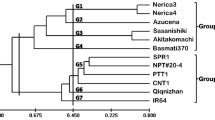Abstract
This study was intended to investigate the extent of genetic differentiation in parental lines of rice hybrids and to analyze the genetic basis underlying the fertility phenomenon in distant crosses. Two subsets of rice material (111 entries in total) were used, including 81 doubled-haploid (DH) lines and 30 Indica and Japonica rice varieties or lines (as a control). The DH lines was derived from a heterotic Indica/Japonica cross (Gui630/02428) by anther culture. The materials in the control represent a broad spectrum of the Asian cultivated rice gene pool including landraces, primitive cultivars, historically important cultivars, modern elite cultivars, super rice and parents of superior hybrids. In accordance with the NC II design, 57 out of the DH lines were test-crossed to two important wide compatibility lines: photoperiod-sensitive genetic male sterile (PGMS) line N422s and thermo-sensitive genetic male sterile (TGMS) line Peiai64s. The F1s and their parents, 182 entries in total, were examined for the performance of seven traits in a replicated field trial. All the rice materials was surveyed for polymorphisms using 92 RFLP markers selected from two published molecular marker linkage maps. Genotypes of the F1 hybrids at the molecular-marker loci were deduced from the parental genotypes. The analysis showed that there were two types of genetic differentiation in the two subsets of rice material; that is, qualitative differentiation in the control and quantitative differentiation in the DH lines. In addition, favorable genic interactions (both intra- or inter-locus) contributed to better increase the fertility in hybrids of distant crosses through incorporation of a wide-compatibility line as the female parent. Favorable genic interactions can be applied in hybrid rice breeding programs by selecting parents with an appropriate extent of genetic differentiation.
Similar content being viewed by others
Author information
Authors and Affiliations
Additional information
Received: 5 June 1997 / Accepted: 10 September 1997
Rights and permissions
About this article
Cite this article
Li, R., Xue, C., Yuan, L. et al. Differentiation and classification of parental lines and favorable genic interactions affecting F1 fertility in distant crosses of rice (Oryza sativa L.). Theor Appl Genet 96, 526–538 (1998). https://doi.org/10.1007/s001220050770
Published:
Issue Date:
DOI: https://doi.org/10.1007/s001220050770




